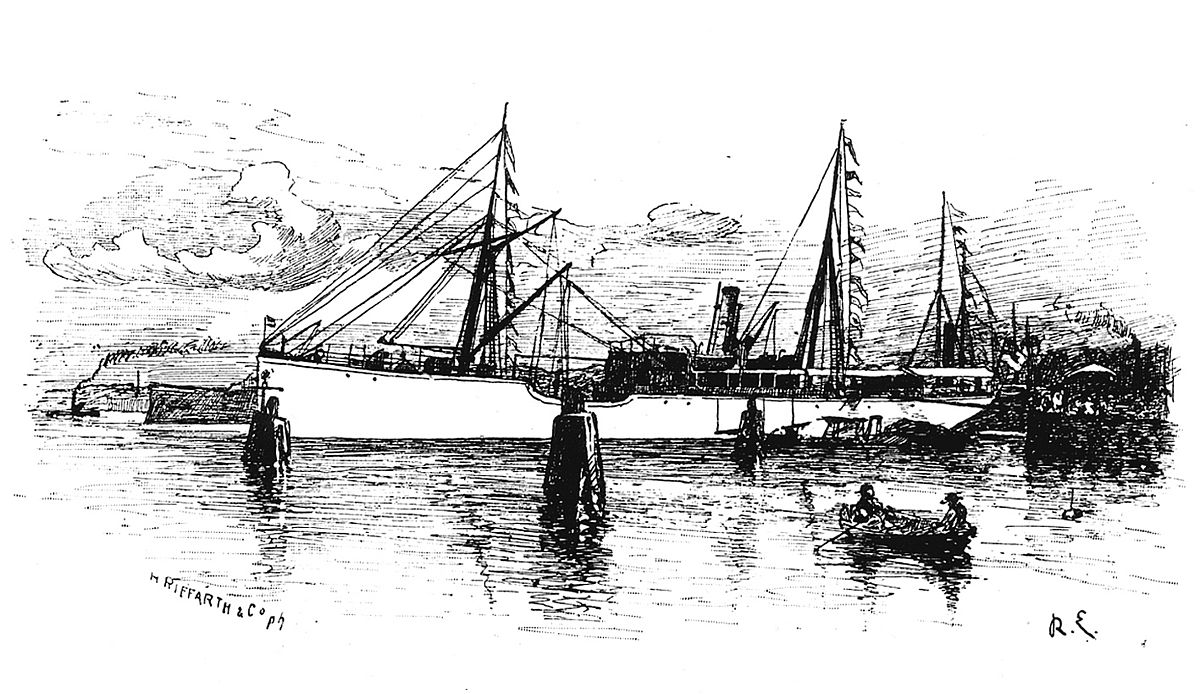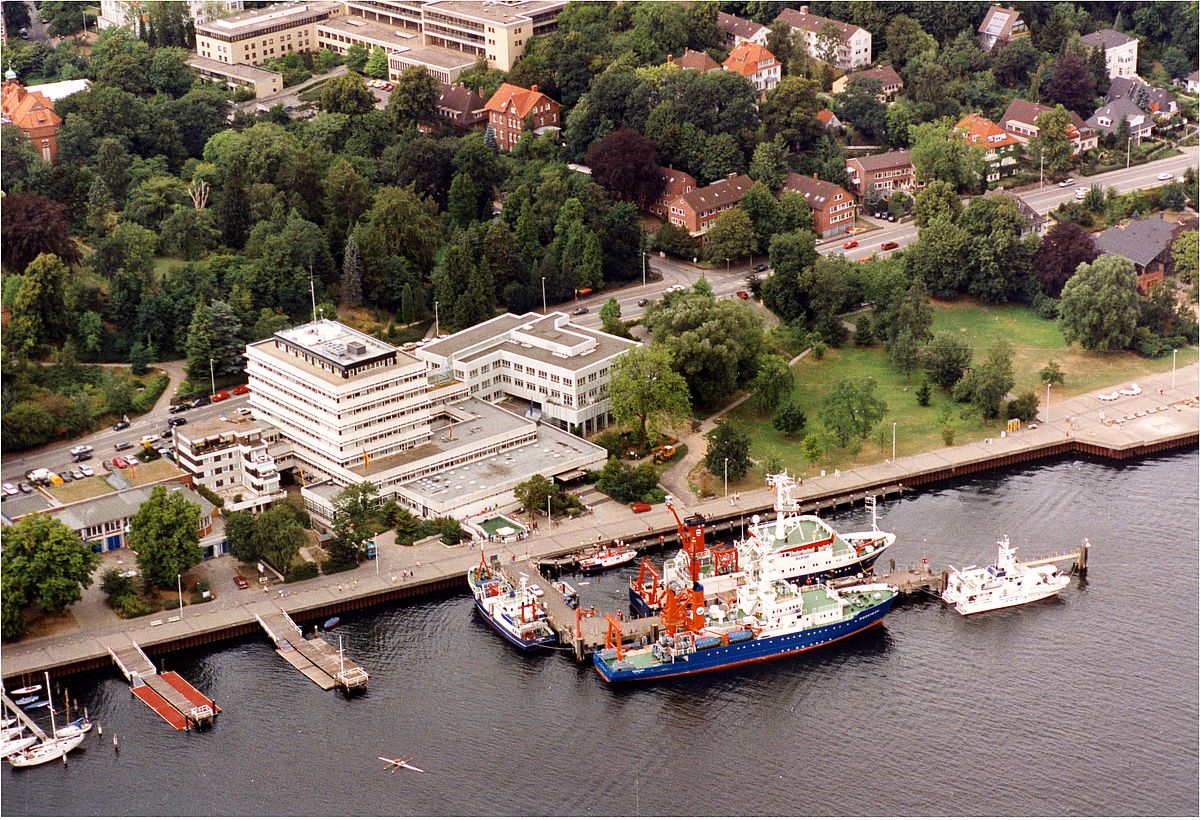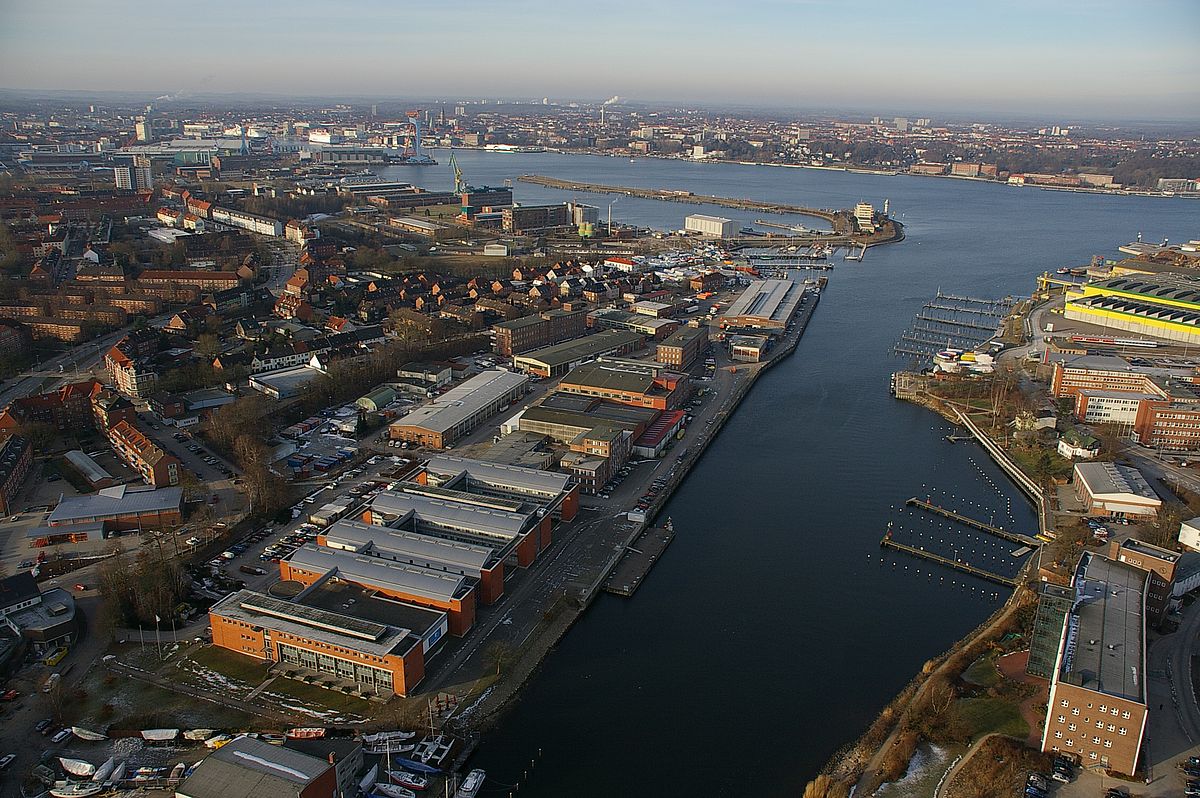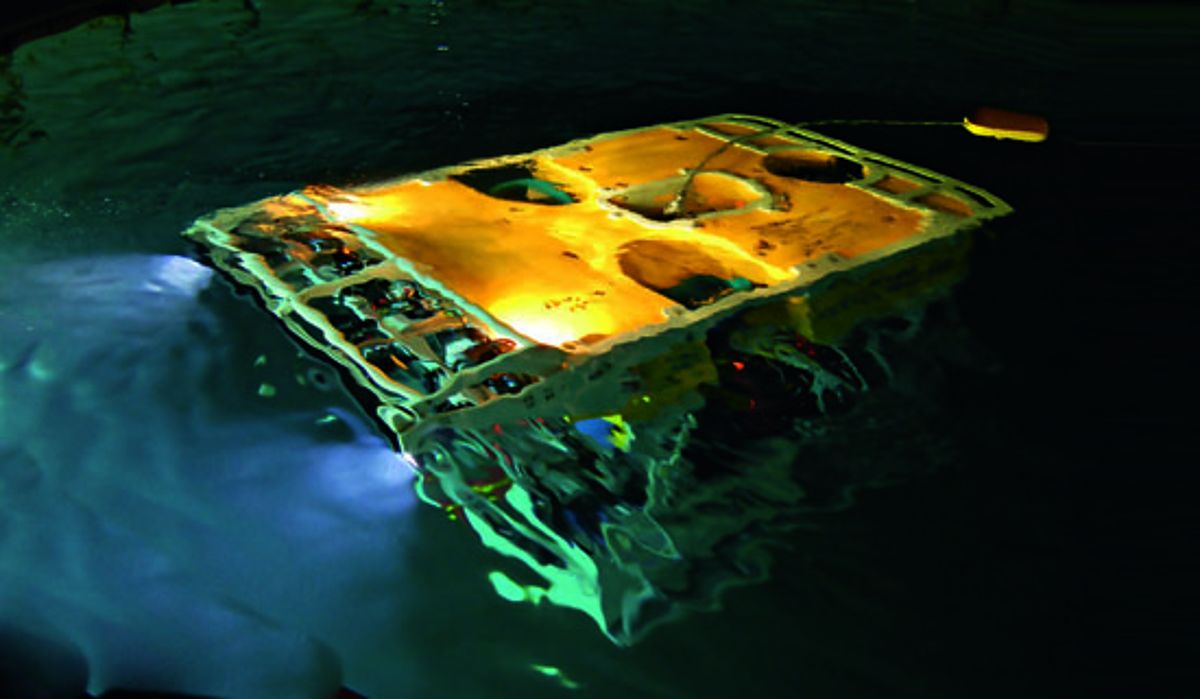GEOMAR Helmholtz Centre for Ocean Research Kiel
Wischhofstr. 1-3
D-24148 Kiel
Germany
Tel.: +49-431 600-0
Fax: +49-431 600-2805
E-mail: info(at)geomar.de
www.geomar.de
History of Ocean Research in Kiel
Back in the late 17th century, 1697 to be exact, a mathematician and physicist at the University of Kiel (CAU), Samuel Reyher (1635-1724), conducted the first recorded marine science experiment in Kiel. His "Experimentum Novum" sought to determine the salinity of the water in Kiel Fjord.
Kiel marine scientists – participants from the very beginning

The British “Challenger” Expedition (1872-76) is usually considered the start of modern ocean science. Many oceanic properties were observed during this voyage, from surface temperatures to features of the deep sea bottom. Several geographers and the navy of the young German Empire were also interested in the ocean. In 1874, the German navy set out from Kiel on a similar project. The “SMS Gazelle” circumnavigated the globe over a period of two years. In addition to performing regular atmospheric and ocean surface observations, scientists investigated ocean currents and water depths, and collected zoological and botanic samples from all three oceans and shorelines. After a meeting of the captains of “HMS Challenger” and “SMS Gazelle” in South America, the return cruises of these two vessels provided the first known multi-ship research program.
At that time, marine science had already been established in Kiel . The physiologist Victor Hensen (1835-1924), the zoologist Karl Möbius (1825-1908) and the industrialist and marine researcher Heinrich Adolph Meyer (1822-1889) studied the ecology of the Kiel Fjord and Bight. Starting in 1862, they used the first research vessel from Kiel, Meyer’s yacht “Marie” – sailing under the Danish flag. As a result of this work, Hensen coined the term “Plankton” for the organisms drifting or floating in the water, and Möbius created the term “biocenosis” for (marine) interacting organisms living in a particular habitat.
The year 1870 marked a significant event for marine sciences in Kiel, with the establishment of the “Prussian Commission on Scientific Studies in German Seas” (the “Kiel Commission”). It was initiated by the University of Kiel professors Victor Hensen, Karl Möbius and Gustav Karsten (1820-1900, physicist and mineralogist) with the objective of strengthening fisheries in German waters in the North and Baltic Seas. The group, under the leadership of Hermann Adolph Meyer, conducted studies on fish distribution and fisheries techniques, but also regular observations of water temperatures and salinities from light ships and at coastal stations. Unfortunately, not all of these data have been preserved.
The “Plankton Expedition” to Greenland and to the tropical Atlantic set out in 1889 on the chartered steamer “National” with a number of marine biologists led by Victor Hensen. During the cruise from the sub-polar to the tropical Atlantic, they collected biological and chemical samples and obtained physical data. The physical observations were conducted by the Kiel geographer Otto Krümmel (1854-1912) who had also become a member of the Commission. During his time as a lecturer and researcher at the CAU, he developed some fundamental methods and instruments in marine science. He is considered an international pioneer of modern oceanography, and he published the first comprehensive textbook on oceanography in German (published in two volumes: 1907 and 1911).
Another milestone in early marine research was the “German Deep Sea Expedition” in 1898-1899 on the chartered steamer “Valdivia”. The planktologists Carl Apstein (1862-1950) and Ernst Vanhoeffen (1858-1918) participated as assistants of the Kiel Commission in this cruise through the Atlantic and the western Indian Ocean.
The “Laboratory for International Marine Research”
The foundation of the “Laboratory for International Marine Research” in Kiel in 1902 under the leadership of Otto Krümmel was a deciding factor in strengthening marine sciences in Kiel. Krümmel had become a member of the “German Scientific Commission for International Marine Research” (DWK). This body had been established in 1900 by the German Ministry of the Interior to act as the national contact to the “International Council for the Exploration of the Sea” (ICES) in Copenhagen. The aim was for ICES member countries to carry out regular sampling and observations in (fish) biology, chemistry and physics in the North and Baltic Seas, to be coordinated in Copenhagen. Overfishing was already a problem at that time. The German “Reichsforschungsdampfer Poseidon” was also brought into service for the DWK. The chemical and physical studies based on “Poseidon” observations dominated the work of the laboratory for decades.
Another important contribution to international marine science was made by the physicist Alexander Behm (1880-1952) who started developing an echo-sounder in Kiel in 1912. This could be used for a precise determination of bottom topography, and the method was used on the research vessel “Meteor”during the “German Atlantic Expedition” (1925-27), marking the beginning of a new phase of deep-sea research. With echo-sounders manufactured by Behm and Elac (both in Kiel), and Atlas (in Bremen), a total of 67,000 depth measurements were collected in the South Atlantic, and the first detailed maps of deep-sea topography resulted from these observations.
The Institut für Meereskunde (Institute for Oceanography) in Kiel

In 1937, the zoologist Adolf Remane (1898-1976) established the "Institut für Meereskunde“ (IfM) at the University of Kiel to research processes in the water column and in the atmosphere above. The marine chemist Hermann Wattenberg (1901-1944), who had earlier participated in the Meteor Expedition, became the second director. The original building of the institute was destroyed during bombing raids in 1944 and the director and part of his staff lost their lives.
A new phase in the development of the IfM began after World War II. The Institut für Meereskunde in Berlin had developed into the leading marine science institution in Germany since its foundation in 1906, but it was also destroyed by bombing raids in 1944, marking the end of marine research in Berlin. Georg Wüst (1890-1977) had been a distinguished member of the Berlin institute and also an earlier participant in the 1925-27 Meteor Expedition. In 1946 he came to Kiel to become the first director of the IfM after the war. The Kiel institute effectively developed into a successor to the earlier Berlin institute, and the work commenced in an old villa in Hohenbergstrasse in Kiel. A small fishing trawler was converted into the first research vessel “Südfall” (renamed the “Hermann Wattenberg” in 1958). When Professor Wüst retired he was succeeded as director of the IfM by Günter Dietrich, with lots of experience from the earlier Berlin institute. The scientific recovery of Germany accelerated during the 1960s, and Professor Dietrich knew how to take advantage of these opportunities for the benefit of marine research. The number of staff increased rapidly and additional research groups introduced new observational methods and developed new instrumentation. The curricula in marine subjects were extended, and education at the University of Kiel held the top rank in Germany for a whole generation of marine scientists. One of the most important steps in the return of German marine science to the international scientific community was the participation of groups from Kiel in the “International Indian Ocean Expedition” in 1964-65. The new “Meteor” research vessel had been commissioned shortly before and took part in this expedition. With the institute’s rapid growth,more space was soon required and a building at Niemannsweg was used from 1965 on. In 1972 the staff then moved into a new building on the waterfront, with an extension following in 1988. Since 1972, the institute has also provided tourist attractions, such as the Harbor Seal Basin and the Aquarium. In 1968, the state-funded university institute was converted to a “Blue List” institute (later the “Leibniz Association”) which included ten research departments with a directorship rotating between departmental heads. This development ensured improved joint funding by federal and state governments while still preserving a close relationship with the university.
A new research field: Marine Geosciences

Studies in marine geosciences had been established at several university institutes in parallel with the work at the IfM; research addressed the processes at the interface between the sea floor and the water column as well as the solid ground underneath. With the growing scientific importance of this field, the establishment of a separate new institute was proposed in 1984. Subsequently, the parliament of the state of Schleswig-Holstein decided unanimously in favor of the foundation of the GEOMAR Research Center for Marine Geosciences. This new center opened in September 1987, directed by Jörn Thiede, a marine geologist. The staff occupied one floor of a historical Kiel Fish Market building until a new building was completed in 1996.
IFM-GEOMAR

There now existed a broad spectrum of marine sciences in Kiel, a unique situation in Germany. Some initial collaboration transformed into plans for a merger which then took place on January 1, 2004 when IfM and GEOMAR combined to form a joint Leibniz Institute at Kiel University (IFM-GEOMAR), directed by the geologist Peter Herzig. The institute then grew rapidly, with a staff of 320 at the time of the merger, and more than 500 by the end of 2008.The four research divisions are Ocean Circulation and Climate Dynamics, Marine Biogeochemistry, Marine Ecology, and Dynamics of the Ocean Floor. Marine scientists from Kiel are involved in worldwide ocean research and contribute to many national and international bodies. At the same time, the institute cooperates closely with related institutes within the CAU and many of IFM-GEOMAR's scientists teach at the university. IFM-GEOMAR and the university collaborate in major research projects. The “Future Ocean” Cluster of Excellence was established within the framework of the federal government’s Excellence Initiative. Partners are the CAU, the IFM-GEOMAR, the Kiel Institute for the World Economy, and the Muthesius Academy of Fine Arts and Design. The Kiel Center for Marine Substances (KiWiZ) was founded in Kiel-Wik in 2005, with the objective of extracting substances from marine organisms that can be used for human and animal medicine, for the protection of plants against diseases, for cosmetics, and for food.The only manned submersible in Germany, JAGO, has had its home at IFM-GEOMAR since 2006. Special funding from the state of Schleswig-Holstein allowed the purchase of the deep sea KIEL 6000, a deep sea, remotely operated underwater vehicle (ROV), and funding from the German Research Foundation (DFG) provided the ABYSS autonomous underwater vehicle (AUV), both in 2008. A further ROV, the PHOCA, was added to IFM-GEOMAR's set of submersibles in 2011.
GEOMAR Helmholtz Centre for Ocean Research Kiel
As of January 1, 2012, the Leibniz Institute of Marine Sciences (IFM-GEOMAR) became the GEOMAR Helmholtz Centre for Ocean Research Kiel, the 18th research centre of the Helmholtz Association.
Literature
-
Siedler, G., J. Thiede, and W. Zenk (2018): Marine sciences in Germany: The restart in Kiel after World War II. Oceanography 31(4). (pdf)
-
Zenk, W., Siedler, G., Wille, P.C., Wegner, G., Thiede, J., Storch, V., Speth, P., Ruprecht, E., Ehrhardt, M., Zeitzschel, B., 2016, published in 2018: Early oceanography and the development of physical and chemical marine sciences in Kiel after World War II. In: Deutsches Schiffahrtsarchiv, Wissenschaftliches Jahrbuch des Deutschen Schiffahrtsmuseums, Bremerhaven, 39, 29-93. (pdf)
-
Thiede, J., Hay, W.W., Sarnthein, M., Schäfer, P., Siedler, G., Stoffers, P. , Storch, V., Suess, E., von Huene, R., Wille, P.C., Zeitzschel, B., Zenk, W., 2016, published in 2018: From a modest start to a flourishing marine research environment: The institutional development of marine geosciences in Kiel/ Germany after World War II. In: Deutsches Schiffahrtsarchiv, Wissenschaftliches Jahrbuch des Deutschen Schiffahrtsmuseums, Bremerhaven, 39, 95-144. (pdf)
- D. Tillmann/J. Rosenplänter (Hg.), Kiel Lexikon, NMS 2010
- W. Chr. Dullo, Die Entwicklung des Forschungszentrums Geomar und künftige Perspektiven. In: G. Kaster (Hg.), Tradition und Aufbruch im Schwentinetal, Husum 2002.
- G. Kortum/B. Culik, IfM. Zeittafel zum 100jährigen Bestehen der Meeresforschung in Kiel
- B. Lohff, G. Kortum et al., 300 Jahre Meeresforschung an der Universität Kiel – ein historischer Rückblick. Berichte aus dem IfM an der CAU Kiel 246, Kiel 1997 (German pdf)


